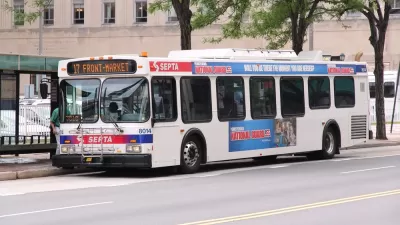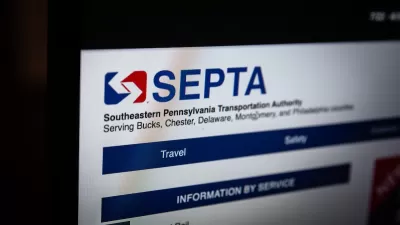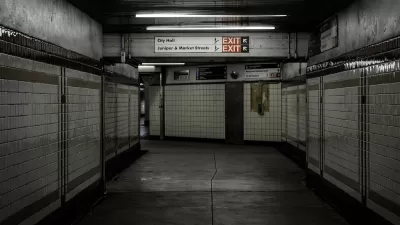A growing coalition of education and transit advocates are calling for a program that would allow Philadelphia-area college students to access transit for free with their student IDs.
Malcolm Burnley writes an op-ed calling for the Southeastern Pennsylvania Transportation Authority to provide free (or nearly free) transit to college students in the area—following similar models in Rhode Island and Pittsburgh.
"Beyond the improved town-and-gown connectivity, both cities and universities benefit from these programs in myriad ways. They increase sustainability goals, help retain graduates and reduce brain drain, and even curb gentrification (more on this later)," according to Burnley.
The idea to bring SEPTA to college students isn't Burnley's alone, a change.org petition is circulating, already gathering 1,080 signatures at the time of the article. According to Burnley, the petition is "calling for SEPTA to sell semester- or year-long passes to universities and colleges at a steeply discounted rate of 50 to 75 percent. In turn, the universities would charge students a nominal fee in their tuition payment—or potentially, nothing at all."
As for the earlier reference about the potential of such a program to curb gentrification, Burnl;ey shares the argument in favor of the program presented by Michael Noda of Sic Transit Philly in a post from earlier this year. Here's Noda's writing on the subject:
"Free transit for students and faculty would radically change the incentives for housing and land use in West Philadelphia and North Philadelphia, where the first few blocks beyond the campuses are increasingly an academic monoculture, rendering them unaffordable even as entire neighborhoods suffer through disinvestment and neglect a mere half-mile away. While not many students or faculty are specifically looking to move to Kingsessing or Carroll Park, a handful willing to try could do wonders for the stability of those neighborhoods, encouraging investment and slowing the displacement that is actually occurring in our city, which is driven much more by blight than by gentrification."
FULL STORY: IDEAS WE SHOULD STEAL: FREE SEPTA FOR STUDENTS

Americans May Be Stuck — But Why?
Americans are moving a lot less than they once did, and that is a problem. While Yoni Applebaum, in his highly-publicized article Stuck, gets the reasons badly wrong, it's still important to ask: why are we moving so much less than before?

Using Old Oil and Gas Wells for Green Energy Storage
Penn State researchers have found that repurposing abandoned oil and gas wells for geothermal-assisted compressed-air energy storage can boost efficiency, reduce environmental risks, and support clean energy and job transitions.

Placekeeping: Setting a New Precedent for City Planners
How a preservation-based approach to redevelopment and urban design can prevent displacement and honor legacy communities.

San Francisco’s Muni Ridership Grew in 2024
The system saw its highest ridership since before the Covid-19 pandemic, but faces a severe budget shortage in the coming year.

Colorado Lawmakers Move to Protect BRT Funding
In the face of potential federal funding cuts, CDOT leaders reasserted their commitment to planned bus rapid transit projects.

Safe Streets Funding in Jeopardy
The Trump administration is specifically targeting bike infrastructure and other road safety projects in its funding cuts.
Urban Design for Planners 1: Software Tools
This six-course series explores essential urban design concepts using open source software and equips planners with the tools they need to participate fully in the urban design process.
Planning for Universal Design
Learn the tools for implementing Universal Design in planning regulations.
Heyer Gruel & Associates PA
City of Moreno Valley
Institute for Housing and Urban Development Studies (IHS)
City of Grandview
Harvard GSD Executive Education
Salt Lake City
NYU Wagner Graduate School of Public Service
City of Cambridge, Maryland





























